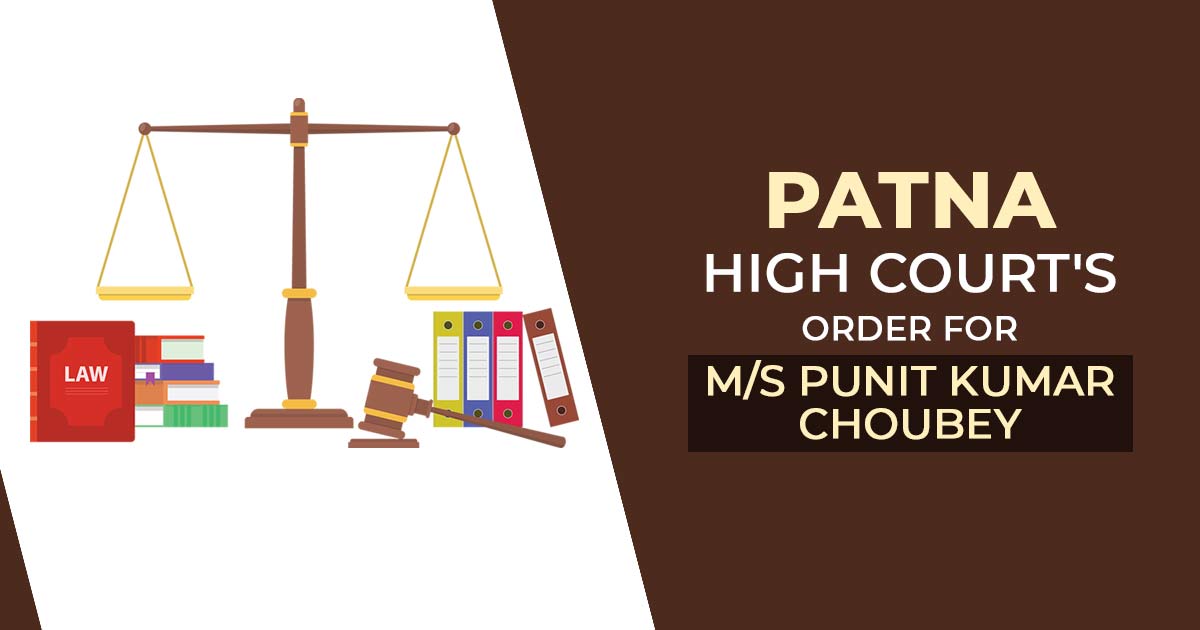
As per the Patna High Court under Article 226 of the Constitution of India, the extraordinary jurisdiction could not be invoked if the taxpayers’ losses file a legal plea to the Central Goods and Service Tax Act (CGST).
The assessment order and the rejected appeal filed were been questioned by the M/s Punit Kumar Choubey based on limitation. It seeks that the assessment order itself was an exparte order.
The statement highlighted the issuance of a notice and multiple chances provided to the assessee to clarify their claim of excessive input tax. Unfortunately, the assessee did not take advantage of these opportunities. Their claims for input tax credits were Rs. 3,78,624.23/- each under the CGST and SGST Act.
The supplier of the petitioner-assessee provided a GSTR-2A reflecting only a credit of Rs. 93,825.77/-. Initially, an electronic notice was posted on the portal dated 17.08.2021, but no response was received. Despite subsequent reminders on 06.09.2021 and 16.09.2021, there was still no reply.
Ultimately, a show-cause notice, coupled with a summary in Form GST DRC-01 dated 08.11.2021, was sent to the petitioner, setting 07.12.2021 as the final hearing date. Regrettably, the petitioner did not attend, leading to the passing of the order on 10.12.2021 under Section 73(9) of the BGST Act.
The order summary was electronically served on 10.12.2021 through the common portal. However, the petitioner filed an appeal with a delay of one month and nine days, submitting it on 10.07.2022, despite the assessment order being dated 10.12.2021.
The High Court has the authority to decline discretion if there exists a sufficient and effective alternative remedy. Its power is wielded only when there’s evidence of breaching natural justice principles or when due procedural steps for the decision-making process have been neglected.
Recommended: GST Council: Constitution, Functions and Decision-making
The bench comprising Chief Justice K Vinod Chandran and Justice Partha Sarthy noted that the petitioner, by not utilizing available statutory remedies, cannot directly approach this Court under Article 226 of the Indian Constitution to contest an assessment order.
This especially applies to matters regarding turnover calculation, taxable turnover determination, and the tax assessment made by the Assessing Officer. The BGST Act offers an appellate remedy under Section 107, which must be sought within three months or, with permission, within an additional month in case of a delay.
The petitioner’s failure to utilize the appellate remedy precludes the use of extraordinary jurisdiction under Article 226 of the Constitution of India in this situation.
The Court determined that the petitioner did not allege any jurisdictional error, breach of natural justice principles, or misuse of the court process in the mentioned writ petition. As a result, the writ petition was dismissed.
| Case Title | M/s Punit Kumar Choubey Vs. Joint Commissioner of State Tax Bhabhua Anchal |
| Case No | 9975 of 2023 |
| Date | 10-08-2023 |
| For the Petitioner/s | Mr. Achhaibar Singh, Advocate |
| For the Respondent/s | Mr. Raghwanand, GA-11 Mr. Sanjay Kumar Tiwari, AC to GA-11 |
| Patna High Court | Read Order |









